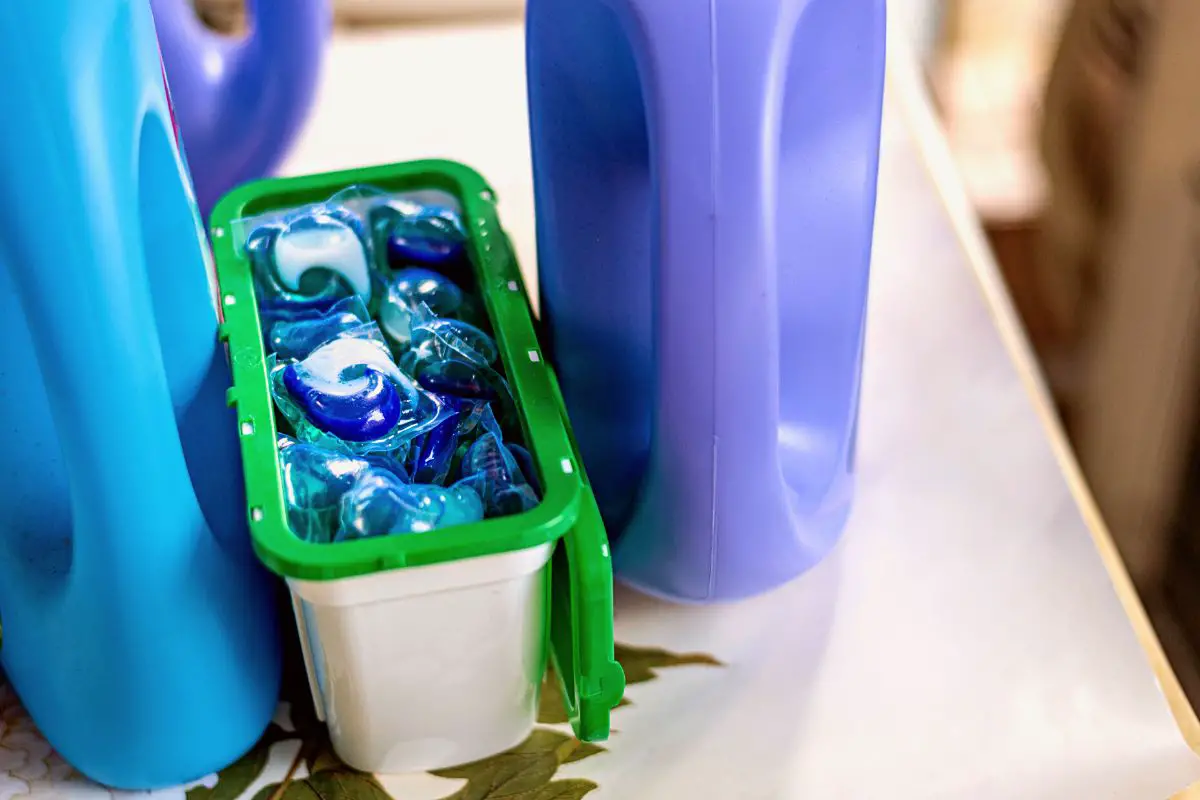What Ingredients Go Into Laundry Detergents? | + how to choose the best one!
Some tasks in life are never-ending. And one such activity is the chore of doing laundry.
Decades back, our ancestors used to mix lye and animal fat like lard to make soaps for cleaning.
Today we have synthetic detergents to help us with laundry. And depending on the variety of dirt that we need to remove from our clothes, these ingredients vary.
Knowing what ingredients are in laundry detergent will help you to understand their impact on your family’s health and the environment.
What Are the Main Ingredients in Laundry Detergent?
Laundry detergents can come in powder or liquid forms. For liquid detergents, the ingredients are liquidized in a solution of water and other chemicals. They are also called solvents.
If you’re looking for detergents with minimized carbon footprint, check out the laundry sheets or pods. These products come in plastic-free packaging and use vegan or environmentally sustainable ingredients.
The problem is many manufacturers don’t list the ingredients in detergents. That makes it harder to point out the exact ingredients in a detergent.

As if that isn’t enough, almost every manufacturer uses a special formula with secret ingredients to get rid of the stains.
However, there are a few common chemicals that are present in most detergents.
Let’s look at the main components of a detergent.
Soluble Salts
These are potassium or sodium salts that act as alkalis. The main purpose of the alkalis is to remove the dirt and grease without the necessity of excess rubbing. Generally, alkalis like sodium hydroxide or potassium hydroxide are used.
The strength of alkalis can vary depending on the chemical used. The pH of the alkali is adjusted to ensure the safety and stability of the detergent.
Surfactants
Surfactants are specially formulated chemicals that do the hard work of lifting tough stains. They lower the surface tension of water which helps the clothes to get wetter. They also help in softening the dirt that does not dissolve naturally in water.
Commonly used surfactants are anionic in nature. However, cationic, nonionic, and amphoteric surfactants are also used.
The chemical action of surfactants is complex; especially for someone like me with limited chemistry knowledge.
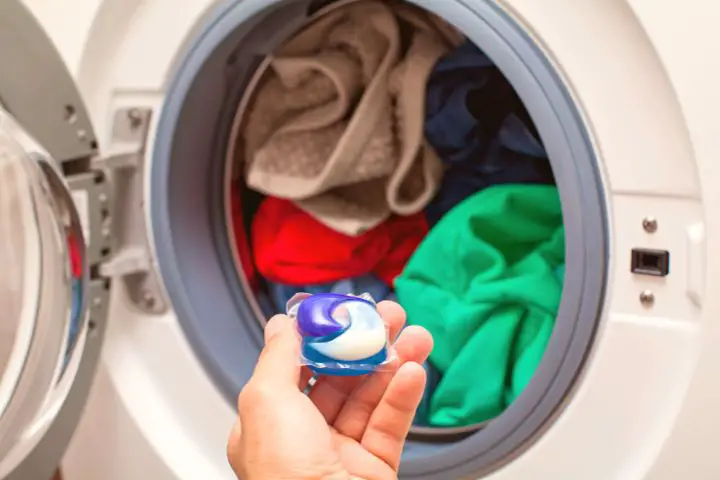
Generally, surfactants have two differently charged ends. The hydrophobic end binds with the dirt while the hydrophilic end binds with water molecules. This helps in the removal of the dirt particles and carrying them away with the wash water.
The performance of the surfactants depends on the hardness or softness of the water. However, a lot of research has gone into developing surfactants that work for both types of water.
Some of the commonly used surfactants are:
- Sodium lauryl sulfate
- Sodium lauryl sulfate
- Alcohol ethoxylate
- Ammonium lauryl sulfate
- Benzethonium chloride
- Fatty acid esters
The problem with surfactants is, they can have various adverse effects on the environment. The wastewater containing these chemicals can be especially damaging to aquatic life.
Catalytic Enzymes
Enzymes are the bad boys that break down stubborn stains by catalytic action. Think of the stubborn stains resulting from hot chocolate or blood. Once these stains are chemically broken down by enzymes, they are washed away by water.
The addition of enzymes has improved the action of laundry detergents in many ways. Now you can get better results by using less detergent and lower water temperatures.
Enzymes can break down specific components like proteins, fats, or starches. Some of the commonly used enzymes are amylase, cellulase, protease, lipase, and mannanase.
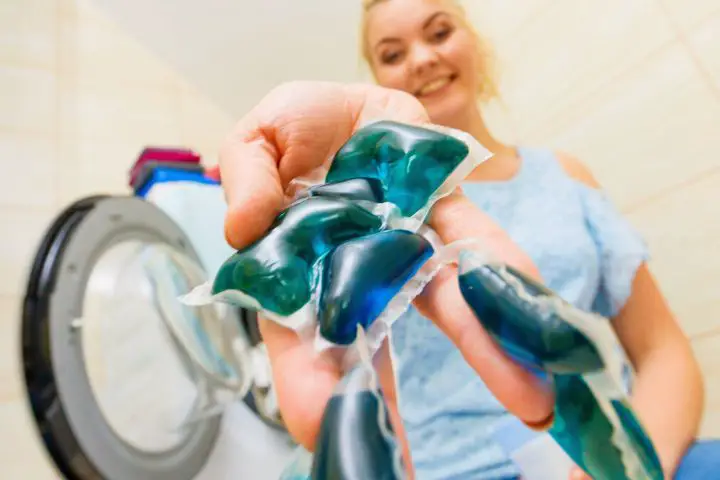
Enzymes can be natural or processed chemically. Different enzymes target specific soils and dirt. The catalytic action breaks the soil into smaller molecules that are easily washed away.
The use of biodegradable, and non-toxic enzymes in detergents can help in reducing the chemical residues that can affect the environment. With advancements in industrial biotechnology, enzyme-based detergents are more eco-friendly than ever.
Other Components
A detergent also contains various other components. Here are some of the major ones.
- Various colors and dyes are added to detergents to improve their aesthetic appeal. The choice of color varies between the manufacturers. In addition, artificial fragrances are also added to the detergent.
- Stabilizers are added to a detergent to control the chemical reactions, especially those related to enzyme action. As a result, the detergent delivers stable performance with the best cleaning action. Other than that, a detergent can also contain pH modifiers that preserve the right acid and base level in the detergent.
- Detergents also contain anti-redeposition agents or protectors. These chemicals prevent the dirt from sticking back to the clothing once they have been removed. These are complex chemicals like carboxymethylcellulose or polyvinyl alcohol that act as a barrier against dirt.
- Optical or UV brighteners coat the fabric with a substance that reflects the visible blue light and makes the clothes look brighter. They do not remove stains but help in hiding them by getting absorbed in the fabric. These brighteners have replaced the harsh bleaches from detergents.
Is Detergent Necessary for Laundry?
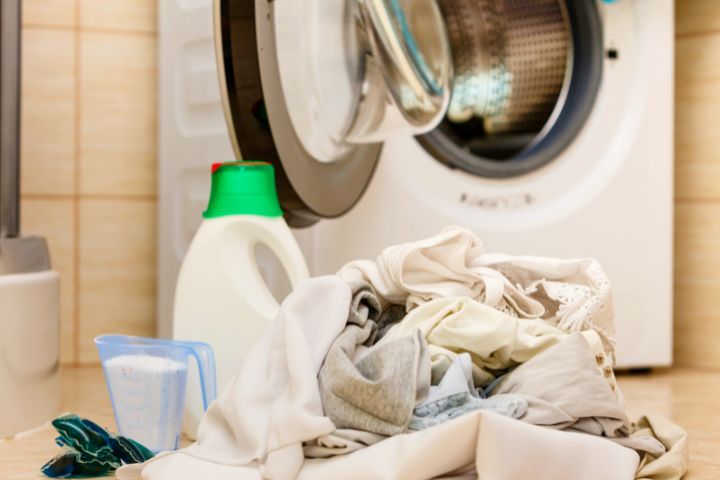
For effective cleaning of clothes, a detergent is necessary. The detergent provides the chemical action that is needed to remove stubborn stains.
The mechanism of laundry cleaning is actually a three-fold process. This includes chemical action, mechanical action, and thermal energy.
Mechanical energy is provided by the machine or from hand-washing. The thermal energy depends on the temperature of the water.
But these two are not sufficient to remove grease. The reason is, oil and water will not mix together. So a chemical that can break down the grease and help in dissolving it in water is necessary.
This is where the chemicals in a detergent, mainly the surfactants and the enzymes, play an important role. Some detergents can function even in cold water without the assistance of thermal energy.
How to Choose the Best Detergent?
It is difficult to specify a single brand that will be the best option. The choice of detergent will depend on the needs of your family and the type of stain that you need to remove.
For heavily-soiled clothes from frequent outdoor use, you will need a powerful detergent with strong enzymatic action. If the clothes are lightly stained, a mild detergent with an effective stain remover should be good enough.
Go through the ingredients to find out if the components will work for your purpose. Also, make sure that the ingredients in the detergent are as environmentally-friendly as possible.
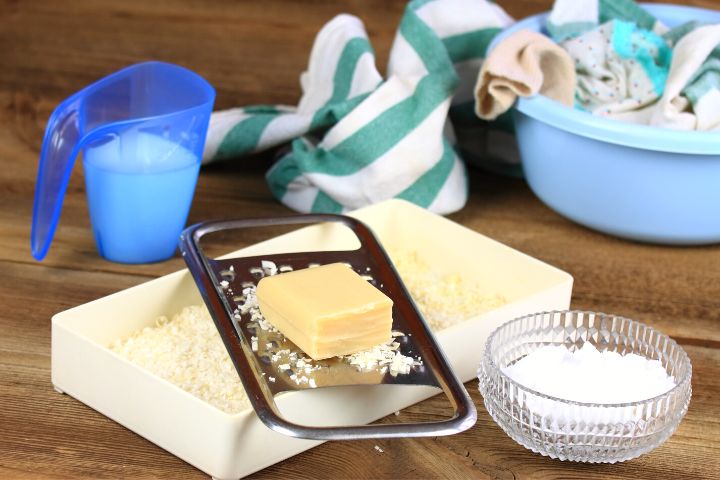
In case you don’t want a chemical-based detergent, you can pick plant-based laundry products that have no adverse effects on the planet.
But do not choose a detergent based on the smell. A fresh-smelling detergent may not provide the best cleaning action.
Knowing what the detergent contains is an important step to make sure that you choose the right product that is effective, as well as safe from all aspects.
Honestly, deciphering the ingredients in a laundry detergent label is a tough task. So, taking the help of the Safer Chemical Ingredients list is a good idea.
Frequently Asked Questions
Are all laundry detergents basically the same?
No, all laundry detergents are not the same. The chemical composition of the products vary depending on their stain-removal ability. Manufacturers also use unique colors and fragrances to make their products stand out.
What ingredient in laundry detergent removes stains?
The primary ingredient in a laundry detergent that removes stains are chemicals called surfactants. In addition, some detergents also contain enzymes that act on specific stains and remove them effectively.
Do all laundry detergents have enzymes?
No, all laundry detergents do not have enzymes. Generally, more expensive detergents contain enzymes that are specially formulated for removing tough stains.

